Deck 9: Comparative Advantage and the Gains From International Trade
Question
Question
Question
Question
Question
Question
Question
Question
Question
Question
Question
Question
Question
Question
Question
Question
Question
Question
Question
Question
Question
Question
Question
Question
Question
Question

Unlock Deck
Sign up to unlock the cards in this deck!
Unlock Deck
Unlock Deck
1/26
Play
Full screen (f)
Deck 9: Comparative Advantage and the Gains From International Trade
1
When Roxanne, a U.S. citizen, purchases a designer dress from Saks Fifth Avenue that was made in Milan, the purchase is
A) both a U.S. and an Italian import.
B) a U.S. import and an Italian export.
C) a U.S. export and an Italian import.
D) neither an export nor an import for either the United States or Italy.
A) both a U.S. and an Italian import.
B) a U.S. import and an Italian export.
C) a U.S. export and an Italian import.
D) neither an export nor an import for either the United States or Italy.
a U.S. import and an Italian export.
2
The largest exporter in the world is
A) Japan.
B) Germany.
C) China.
D) the United States.
A) Japan.
B) Germany.
C) China.
D) the United States.
China.
3
Which of the following statements is true?
A) The United States is more dependent on foreign trade than is the United Kingdom.
B) Imports and exports account for over one-half of the GDP of Belgium.
C) France is the leading exporting country, accounting for 10 percent of total world exports.
D) Because the cost of labor used on farms is so high, the United States exports very little of its wheat, rice and corn crops.
A) The United States is more dependent on foreign trade than is the United Kingdom.
B) Imports and exports account for over one-half of the GDP of Belgium.
C) France is the leading exporting country, accounting for 10 percent of total world exports.
D) Because the cost of labor used on farms is so high, the United States exports very little of its wheat, rice and corn crops.
Imports and exports account for over one-half of the GDP of Belgium.
4
What is a tariff?

Unlock Deck
Unlock for access to all 26 flashcards in this deck.
Unlock Deck
k this deck
5
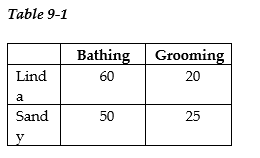
Linda and Sandy own The Preppy Puppy, a dog grooming business. Table 9-1 lists the number of dogs Linda and Sandy can each bathe and groom in one week.
-Refer to Table 9-1. Select the statement that accurately interprets the data in the table.
A) Linda has an absolute advantage in dog bathing and Sandy has an absolute advantage in dog grooming.
B) Sandy has an absolute advantage in dog bathing and Linda has an absolute advantage in dog grooming.
C) Sandy has an absolute advantage in dog bathing and dog grooming.
D) Linda has an absolute advantage in dog bathing and dog grooming.

Unlock Deck
Unlock for access to all 26 flashcards in this deck.
Unlock Deck
k this deck
6
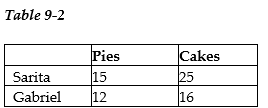
Sarita and Gabriel own S&G Bakery. Table 9-2 lists the number of pies and cakes Sarita and Gabriel can each bake in one day.
-Refer to Table 9-2. Select the statement that accurately interprets the data in the table.
A) Sarita has an absolute advantage in baking cakes and Gabriel has an absolute advantage in baking pies.
B) Sarita has an absolute advantage in baking pies and Gabriel has an absolute advantage in baking cakes.
C) Sarita has an absolute advantage in baking pies and cakes.
D) Gabriel has an absolute advantage in baking pies and cakes.

Unlock Deck
Unlock for access to all 26 flashcards in this deck.
Unlock Deck
k this deck
7
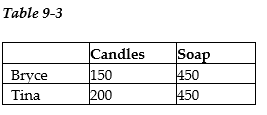
Bryce and Tina are artisans who produce homemade candles and soap. Table 9-3 lists the number of candles and bars of soap Bryce and Tina can each produce in one month.
-Refer to Table 9-3. Select the statement that accurately interprets the data in the table.
A) Bryce has an absolute advantage in making candles and Tina has an absolute advantage in making soap.
B) Bryce has an absolute advantage in making soap and Tina has an absolute advantage in making candles.
C) Bryce has an absolute advantage in making soap.
D) Tina has an absolute advantage in making candles.

Unlock Deck
Unlock for access to all 26 flashcards in this deck.
Unlock Deck
k this deck
8
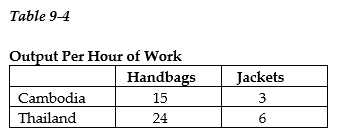
Table 9-4 shows the output per hour of work for handbags and jackets in Cambodia and in Thailand.
-Refer to Table 9-4. Fill in the following table with the opportunity costs of producing handbags and jackets for Cambodia and Thailand.


Unlock Deck
Unlock for access to all 26 flashcards in this deck.
Unlock Deck
k this deck
9
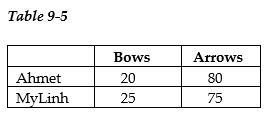
Table 9-5 shows the output per week for bows and arrows by Ahmet and MyLinh.
-Refer to Table 9-5. Fill in the following table with the opportunity costs of producing bows and arrows for Ahmet and MyLinh.


Unlock Deck
Unlock for access to all 26 flashcards in this deck.
Unlock Deck
k this deck
10

Denmark and Belize can produce both clocks and hats. Each country has a total of 200 available labor hours for the production of clocks and hats. Table 9-6 shows the output per hour of work, the production and consumption quantities without trade, and the production numbers with trade.
-Refer to Table 9-6. Which country has an absolute advantage in producing clocks?
A) Denmark
B) Belize
C) both countries
D) neither country

Unlock Deck
Unlock for access to all 26 flashcards in this deck.
Unlock Deck
k this deck
11

Denmark and Belize can produce both clocks and hats. Each country has a total of 200 available labor hours for the production of clocks and hats. Table 9-6 shows the output per hour of work, the production and consumption quantities without trade, and the production numbers with trade.
-Refer to Table 9-6. Which country has an absolute advantage in producing hats?
A) Denmark
B) Belize
C) both countries
D) neither country

Unlock Deck
Unlock for access to all 26 flashcards in this deck.
Unlock Deck
k this deck
12

Denmark and Belize can produce both clocks and hats. Each country has a total of 200 available labor hours for the production of clocks and hats. Table 9-6 shows the output per hour of work, the production and consumption quantities without trade, and the production numbers with trade.
-Refer to Table 9-6. Which country has a comparative advantage in producing clocks?
A) Denmark
B) Belize
C) both countries
D) neither country

Unlock Deck
Unlock for access to all 26 flashcards in this deck.
Unlock Deck
k this deck
13

Denmark and Belize can produce both clocks and hats. Each country has a total of 200 available labor hours for the production of clocks and hats. Table 9-6 shows the output per hour of work, the production and consumption quantities without trade, and the production numbers with trade.
-Refer to Table 9-6. Which country has a comparative advantage in producing hats?
A) Denmark
B) Belize
C) both countries
D) neither country

Unlock Deck
Unlock for access to all 26 flashcards in this deck.
Unlock Deck
k this deck
14

Denmark and Belize can produce both clocks and hats. Each country has a total of 200 available labor hours for the production of clocks and hats. Table 9-6 shows the output per hour of work, the production and consumption quantities without trade, and the production numbers with trade.
-Refer to Table 9-6. What is the opportunity cost to produce 1 hat in Belize?
A) 1/2 of a clock
B) 2/3 of a clock
C) 1.5 clocks
D) 2 clocks

Unlock Deck
Unlock for access to all 26 flashcards in this deck.
Unlock Deck
k this deck
15

Denmark and Belize can produce both clocks and hats. Each country has a total of 200 available labor hours for the production of clocks and hats. Table 9-6 shows the output per hour of work, the production and consumption quantities without trade, and the production numbers with trade.
-Refer to Table 9-6. What is the opportunity cost to produce 1 clock in Belize?
A) 1/2 of a hat
B) 2/3 of a hat
C) 1.5 hats
D) 2 hats

Unlock Deck
Unlock for access to all 26 flashcards in this deck.
Unlock Deck
k this deck
16

Denmark and Belize can produce both clocks and hats. Each country has a total of 200 available labor hours for the production of clocks and hats. Table 9-6 shows the output per hour of work, the production and consumption quantities without trade, and the production numbers with trade.
-Refer to Table 9-6. With trade, what is the total gain in clock production?
A) 150 clocks
B) 300 clocks
C) 2,100 clocks
D) 2,250 clocks

Unlock Deck
Unlock for access to all 26 flashcards in this deck.
Unlock Deck
k this deck
17

Denmark and Belize can produce both clocks and hats. Each country has a total of 200 available labor hours for the production of clocks and hats. Table 9-6 shows the output per hour of work, the production and consumption quantities without trade, and the production numbers with trade.
-Refer to Table 9-6. If the actual terms of trade are 1 hat for 1.8 clocks and 150 hats are traded, how many hats will Denmark gain compared to the "without trade" numbers?
A) -150
B) 0
C) 150
D) 1,050

Unlock Deck
Unlock for access to all 26 flashcards in this deck.
Unlock Deck
k this deck
18

Denmark and Belize can produce both clocks and hats. Each country has a total of 200 available labor hours for the production of clocks and hats. Table 9-6 shows the output per hour of work, the production and consumption quantities without trade, and the production numbers with trade.
-Refer to Table 9-6. If the actual terms of trade are 1 hat for 1.8 clocks and 150 hats are traded, how many hats will Belize gain compared to the "without trade" numbers?
A) -100
B) 0
C) 150
D) 250

Unlock Deck
Unlock for access to all 26 flashcards in this deck.
Unlock Deck
k this deck
19

Denmark and Belize can produce both clocks and hats. Each country has a total of 200 available labor hours for the production of clocks and hats. Table 9-6 shows the output per hour of work, the production and consumption quantities without trade, and the production numbers with trade.
-Refer to Table 9-6. If the actual terms of trade are 1 hat for 1.8 clocks and 150 hats are traded, how many clocks will Belize gain compared to the "without trade" numbers?
A) -100
B) 100
C) 120
D) 250

Unlock Deck
Unlock for access to all 26 flashcards in this deck.
Unlock Deck
k this deck
20
By 2018, the U.S. trade deficit with China
A) had fallen to almost zero.
B) was nearly $350 billion.
C) had decreased to the same level of the early 2000s.
D) had become a trade surplus.
A) had fallen to almost zero.
B) was nearly $350 billion.
C) had decreased to the same level of the early 2000s.
D) had become a trade surplus.

Unlock Deck
Unlock for access to all 26 flashcards in this deck.
Unlock Deck
k this deck
21
Which of the following is the best example of a quota?
A) a limit imposed on the number of sport utility vehicles that the United States can import from Japan
B) a subsidy granted by the U.S. government to domestic sport utility vehicle manufacturers so they can compete more effectively with foreign sport utility vehicle manufacturers
C) a tax placed on all sport utility vehicles sold in the domestic market
D) a $5,000 per-car fee imposed on all sport utility vehicles imported into the United States
A) a limit imposed on the number of sport utility vehicles that the United States can import from Japan
B) a subsidy granted by the U.S. government to domestic sport utility vehicle manufacturers so they can compete more effectively with foreign sport utility vehicle manufacturers
C) a tax placed on all sport utility vehicles sold in the domestic market
D) a $5,000 per-car fee imposed on all sport utility vehicles imported into the United States

Unlock Deck
Unlock for access to all 26 flashcards in this deck.
Unlock Deck
k this deck
22
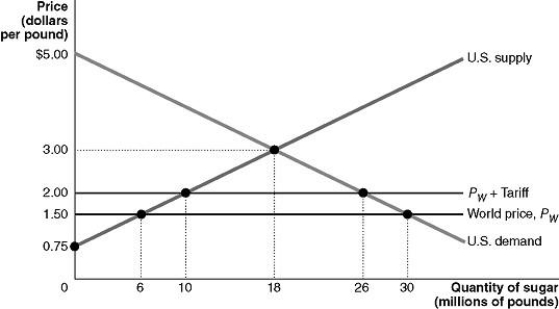
Suppose the U.S. government imposes a $0.50 per pound tariff on sugar imports. Figure 9-4 shows the demand and supply curves for sugar and the impact of this tariff.
-Use Figure 9-4 to answer questions a-i.
a. Following the imposition of the tariff, what is the price that domestic consumers must now pay and what is the quantity purchased?
b. Calculate the value of consumer surplus with the tariff in place.
c. What is the quantity supplied by domestic sugar producers with the tariff in place?
d. Calculate the value of producer surplus received by U.S. sugar producers with the tariff in place.
e. What is the quantity of sugar imported with the tariff in place?
f. What is the amount of tariff revenue collected by the government?
g. The tariff has reduced consumer surplus. Calculate the loss in consumer surplus due to the tariff.
h. What portion of the consumer surplus loss is redistributed to domestic producers? To the government?
i. Calculate the deadweight loss due to the tariff.

Unlock Deck
Unlock for access to all 26 flashcards in this deck.
Unlock Deck
k this deck
23
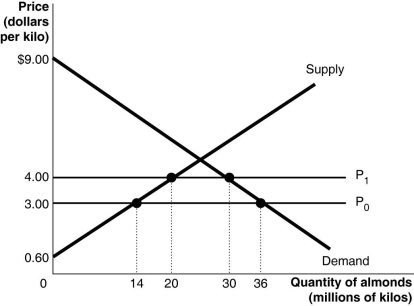
Bragabong currently both produces and imports almonds. The government of Bragabong decides to restrict international trade in almonds by imposing a quota that allows imports of only 10 million kilos each year. Figure 9-5 shows the estimated demand and supply curves for almonds in Bragabong and the results of imposing the quota.
-Use Figure 9-5 to answer questions a-j.
a. If there is no quota what is the domestic price of almonds and what is the quantity of almonds demanded by consumers?
b. If there is no quota how many kilos of almonds would domestic producers supply and what quantity would be imported?
c. If there is no quota what is the dollar value of consumer surplus?
d. If there is no quota what is the dollar value of producer surplus received by producers in Bragabong?
e. If there is no quota what is the revenue received by foreign producers who supply almonds to Bragabong?
f. With a quota in place what is the price that consumers of Bragabong must now pay and what is the quantity demanded?
g. With a quota in place what is the dollar value of consumer surplus? Are consumers better off?
h. With a quota in place what is the dollar value of producer surplus received by producers in Bragabong? Are domestic producers better off?
i. Calculate the revenue to foreign producers who are granted permission to sell in Bragabong after the imposition of the quota.
j. Calculate the deadweight loss as a result of the quota.

Unlock Deck
Unlock for access to all 26 flashcards in this deck.
Unlock Deck
k this deck
24
The term used by economists to describe a situation in which one country raises tariffs and other countries retaliate by raising tariffs on the first country's exports is
A) embargo.
B) globalization.
C) trade war.
D) autarky.
A) embargo.
B) globalization.
C) trade war.
D) autarky.

Unlock Deck
Unlock for access to all 26 flashcards in this deck.
Unlock Deck
k this deck
25
Suppose that American firms claim that protectionism in Canada is on the rise as the Canadian government attempts to protect its infant industries with a "Buy Canadian" provision, in which all government contracts require the use of Canadian-made products. This policy is likely to cause
A) exporting countries to retaliate by placing trade barriers on their imports from Canada.
B) Canadian manufacturers to become more efficient.
C) Canadian companies to pay lower prices for protected products.
D) most countries to reduce their own trade barriers to be able to better compete with Canadian imports at home.
A) exporting countries to retaliate by placing trade barriers on their imports from Canada.
B) Canadian manufacturers to become more efficient.
C) Canadian companies to pay lower prices for protected products.
D) most countries to reduce their own trade barriers to be able to better compete with Canadian imports at home.

Unlock Deck
Unlock for access to all 26 flashcards in this deck.
Unlock Deck
k this deck
26
While attending the World Economic Forum in Davos, Switzerland in January 2020, President Trump threatened to impose tariffs on European automobiles if he could not negotiate a free trade deal with the European Union (EU), sparking backlash from EU officials and company executives. Trump has credited tariffs with helping to work out better trade deals with China, Mexico, and Canada, and believes the same can happen with the EU. Although not specifying a timeline for the possible auto tariffs, Trump did announce that he had reached a deal with French President Emmanuel Macron to delay a digital services tax against U.S. tech companies until the end of 2020 after threatening a 100% tariff on French wine.
Source: Jacob Pramuk, " Trump says he is serious about slapping tariffs on European cars if he cannot strike a trade deal," cnbc.com, January 21, 2020.
-Refer to the Article Summary. All else equal, if the Trump administration decides to implement a tariff on European automobiles, the price of imported automobiles in the United States will ________ and the quantity of imported automobiles demanded in the United States will ________.
A) increase; increase
B) increase; decrease
C) decrease; increase
D) decrease; decrease
Source: Jacob Pramuk, " Trump says he is serious about slapping tariffs on European cars if he cannot strike a trade deal," cnbc.com, January 21, 2020.
-Refer to the Article Summary. All else equal, if the Trump administration decides to implement a tariff on European automobiles, the price of imported automobiles in the United States will ________ and the quantity of imported automobiles demanded in the United States will ________.
A) increase; increase
B) increase; decrease
C) decrease; increase
D) decrease; decrease

Unlock Deck
Unlock for access to all 26 flashcards in this deck.
Unlock Deck
k this deck


